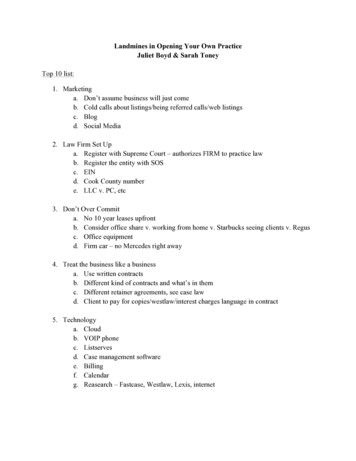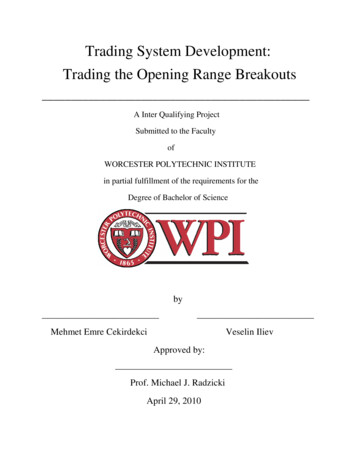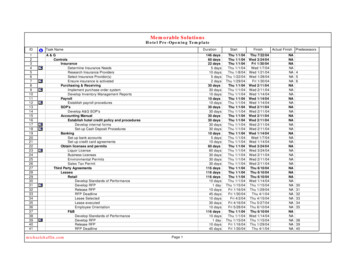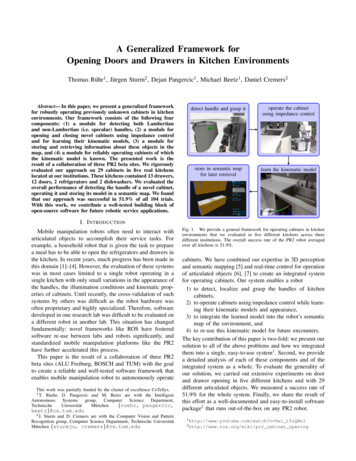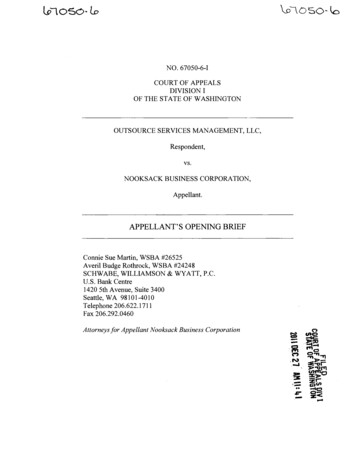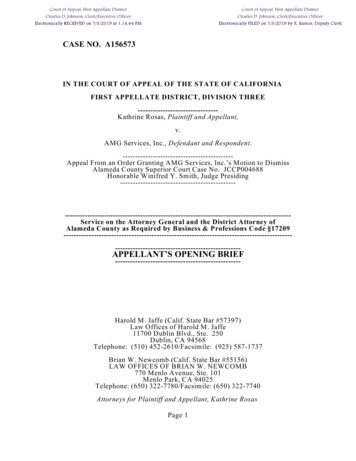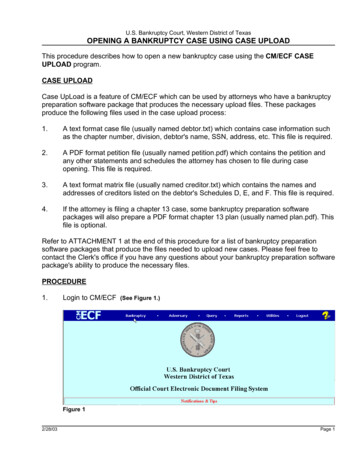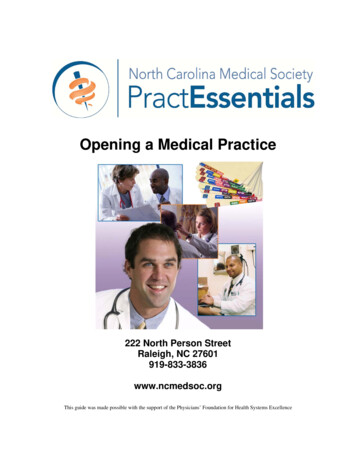
Transcription
Opening a Medical Practice222 North Person StreetRaleigh, NC 27601919-833-3836www.ncmedsoc.orgThis guide was made possible with the support of the Physicians’ Foundation for Health Systems Excellence
Starting a Medical Practice in North CarolinaIt’s been a long, hard road, and now you are about to achieve your dream —your own medical practice. But how to ensure it will be a success? Where doyou get all the information you need for establishing your own medical practice?Just trying to figure out what needs to be done and when to do it isoverwhelming. The two most significant problems physicians face when makingthe decision to start their own practice are:1. Lack of planning. Starting a medical practice is the same as starting anysmall business. It takes preparation and a considerable time commitmentto complete everything that needs to be done. Remember nobody else isgoing to handle everything for you, so be prepared to follow through on allthe details.2. Trying to do it all your self. You may be a highly trained clinician, butunless you have managed a medical practice before, you’re not qualifiedto do it. There are qualified professionals out there that can help. Don’tlet ego get in the way of lettings help you succeed.There are no off the shelf solutions when it comes to starting a medical practice.One key to a thriving practice is getting off to a healthy start, with the rightstructure, people, and processes. From securing a loan to hiring staff to choosingsoftware and equipment, a myriad of tasks and important decisions awaits youthat may affect your practice operations for years to come.This information contained in this article will assist you by providing you with theinformation you need, with an organized checklist of the major tasks that need tobe accomplished, and the approximate time frames in which to complete them.In addition, the resources you will need specific to North Carolina are madeavailable.2
Table of ContentsLegal Organization . 4Practice Options . 8Practice Location. 9Professional Affiliation . 10Licenses . 11National Provider Identification . 14Insurance . 17Worker’s Compensation . 19Vendors & Suppliers . 20Personnel Management . 22Policy & Procedures. 25HIPPA . 26Managed Care & Credentialing . 28Coding & Documentation . 31What Triggers an Audit? . 32Financial Management . 33Marketing . 37Vendor Directory . 39Federal Laws that affect Employment . 42Checklist . 443
Legal OrganizationIn North Carolina, the legal organization of the practice will have specificfinancial, legal, and tax ramifications. Following is a brief description of theoptions for the legal organization of a medical practice.ProprietorshipA one-owner, unincorporated business (includes husband and wife). Easy to form and dissolve; Owner pays all federal income tax; Owner fully liable for all business debts and liabilities; Limited medical deductions allowed to owner; and Limited deductions available for retirement plans.PartnershipA multiple-owner, unincorporated business.General PartnershipA multiple-owner, unincorporated business. Can be easy to form; however, the more time and expense spent duringformation, the less time, expense, and potential litigation involved in dissolution; Partnership files “information federal income tax return,” but pays no tax; Partners pay tax on their shares of partnership income and loss (whetherreceived or not); Partners fully liable for all business debts and liabilities, including thepartnership liabilities and the torts (malpractice/personal injuries) incurred by theother partners; Limited medical deductions allowed to partners; and Limited deductions available for retirement plans.4
Limited Liability Partnership (LLP)A general partnership, but with the following differences: Partner not subject to personal liability for the malpractice of another partnerunless he or she participates or is responsible for supervising the partnercommitting the malpractice. The partners are liable for the contractual debts and other liabilities andobligations of the partnership. The owners of a limited liability company are called members.Corporation/Professional Association (PA)A corporation formed by physicians for the purpose of conducting the practice ofmedicine. The business organization is a legal entity separate and distinct fromits owners. Fairly complex to form and dissolve (plus filing with the secretary of state andapplicable filing and annual fees); Owners (shareholders) not liable for corporate liabilities, including the torts(malpractice/personal injuries) and debts of others; and Can be structured as C corporation or S corporation.C Corporation: A Regular Corporation Corporation subject to federal income tax on corporate income; Shareholders also taxed on the income and/or dividends received; Medical expenses fully deductible; and Greater deductions available for retirement plans.S Corporation: A Small Business Corporation Corporation files “information federal income tax return,” but pays no tax; Shareholders taxed on their shares of corporate income and loss whetherreceived or not (i.e., for federal income tax purposes, treated as proprietorship orpartnership);5
Strict limitations on types and number of shareholders; As with proprietorships and partnerships, limited deductibility of medicalexpenses; and As with proprietorships and partnerships, limited deductions available forretirement plans.501(a) Corporation: A Nonprofit Health Care Corporation Non-profit corporations are distinguished from business corporations not bytheir organizational structure, or by the management of the organization, but bythe purpose of such corporations. Unlike business corporations, non-profitcorporations are not formed to make profit or financial gain for their owners. Typically has one shareholder (member), which is a hospital, and the officersand directors are physicians; While the nonphysician shareholder(s) may exercise decision-making authorityover financial matters, physicians must make all medical decisions; Also may qualify as a nonprofit organization for federal or state income taxpurposes. If so, the corporation pays no federal or state income tax.Professional Limited Liability Company(PLLC, LLC, or LC)A hybrid entity, having attributes of partnerships and corporations. Complex to form and dissolve (plus filing with secretary of state and applicablefiling fees); If structured as a partnership for federal income tax purposes: LLC files “information federal income tax return,” but pays no tax; members aretaxed on their shares of LLC income and loss whether received or not (i.e., forfederal income tax purposes, treated as a proprietorship or partnership); Owner(s) pay federal income tax on their shares of LLC income whetherreceived or not;6
As with proprietorships and partnerships, limited deductibility of medicalexpenses; and As with proprietorships and partnerships, limited deductions available forretirement plans; If structured as a corporation for federal income tax purposes: LLC pays federal income tax on LLC income; Owners also taxed on the income and/or dividends received; As with corporations, medical expenses fully deductible; and As with corporations, greater deductions available for retirement plans; Greater flexibility than corporations in structuring distributions; and Owners (members) not liable for LLC liabilities, including the torts(malpractice/personal injuries) and debts of others.Tax IdentificationOnce you have decided on the legal organization of your practice, you mustobtain a federal tax identification number (TIN) or an employer identificationnumber (EIN). Medicare and other managed care plans will use the TIN/EIN toidentify you or your organization for tax purposes. To obtain a number, completeInternal Revenue Service (IRS) Form SS4, which you can get by calling the IRSat (800) 829-1040. If you have secured the services of an attorney, the TIN/EINapplication can be completed upon incorporation.You should seek legal counsel carefully looking at the advantages anddisadvantages of each structure before deciding which type of legal organizationbest suits your needs. For more information regarding North Carolina guidelinesto incorporation and naming your practice, contact:North Carolina Secretary of StateP.O. Box 29622Raleigh, NC 27626-0622Telephone: (919) 807-2000Website: www.seceratary.state.nc.us\Corporations\7
Practice OptionsStructureYour choice of structure and environment for your medical practice involvesseveral factors, including autonomy of decision making, financial implications(including risk taking and income sharing), and professional considerations(including provision of after-hours coverage for patients).BASIC PRACTICE CATEGORIESSolo PracticeAdvantagesDisadvantagesAutonomyLack of readily available afterhours coveragePersonal SatisfactionFinancial riskTime demandsInability to solve all problemsMulti- Speciality Group PracticeAdvantagesDisadvantagesReadily available consultationLoss of autonomyProvision of full range medicalservicesImplied expectationsUse of single medical recordQuestions of income distributionSharing of after-hours coverageNeed to adhere to establishedpoliciesSharing of financial risk8
Single-Speciality Group PracticeAdvantagesDisadvantagesPhysicians have similarphilosophy and scopeLimitations of diversityPhysicians have similar incomeLoss of autonomySharing of after-hours coverageNeed to adhere to establishedpoliciesSharing of financial riskPractice LocationWhen choosing a practice location, consider the following criteria: Competition — How many other primary care/specialist physicians are in thearea? Economic factors — Does the area support large industries, schools, orgovernment offices? What is thepayer mix in the area (e.g., Medicare and Medicaid population)? Demographics of the area — What are the population, age, sex, race, andeducational factors of the area? Availability of space — Is medical office space available, or will you have tolease non-medical space?9
Professional AffiliationsEstablish relationships with certain professional entities who can help you withthe details of starting your private practice and maintaining smooth operations asyour practice grows. Due to the unique nature of medical practice, you shouldensure that these professionals have relevant health care experience. (Seeappendix A for the NCMS Professional Directory) Banker. You may need to acquire a loan for start-up operations and workingcapital needs. Some banks have established departments that work only withphysicians and other health care entities to start a practice. Typically, for thebank to consider you for a loan, you will need to provide your personal taxreturns for two years and a business plan or financial proforma. Health care attorney. In addition to helping you establish the legal organizationof the practice, the attorney also can interpret employment contracts, managedcare contracts, and leases. Health care accountant. Many physician practices hire a certified publicaccountant (CPA) for accounts payable, payroll, and quarterly/yearly taxpreparation. The CPA also can develop physician compensation plans. Health care consultant. Health care consultants are available to provide avariety of services to physician practices. For example, a health care consultantcan handle all of the details of starting a medical practice while you finish yourresidency. Consultants also can perform operations assessments, billing andcollections assessments, coding and documentation reviews, and on-site stafftraining. Be sure to check the consultant’s references before hiring.10
LicensesYou have made the decision to establish a medical practice in North Carolina.Before you see your first patient there are a number of licensing and registrationrequirements involved in starting a new practice.Medical LicenseIn order to practice medicine in North Carolina, physicians must be licensed bythe North Carolina Medical Board. Once your medical license is received, youmust register your medical license each year within 30 days of your birthday.Should your register more than 30 days after your birthday, a late fee of 50.00 isrequired in addition to the 175.00 registration fee. The Board sends aregistration form by first class mail to registered physician’s approximately onemonth before their birthday. Should you not receive such a mailing, you mustcontact the Board within a day or two of your birthday and request a registrationform. Physicians who complete and send the registration form, and the required 175.00 fee to the Board will receive a new annual registration certificate. Youmay also request a medical license application or complete the initial or annualregistration on line at www.ncmedboard.org and pay the required fee via creditcard. The Board will send a notice of failure to register to any physician who is30 days delinquent in registering his or her license (notices are sent to thephysician’s last known address). If there is no response from the physicianwithin 30 days, the license will automatically become inactive. No other noticeswill be sent. A physician may not practice in North Carolina without his or herlicense.To apply for a license to practice medicine in North Carolina, please contact:North Carolina Medical BoardP.O. Box 2007Raleigh, NC 27619-007Telephone: (919) 326-1100 or (800) 253-9653Fax: (919) 326-0036Website: www.ncmedboard.org(reference: North Carolina Medical Practice Act (N.C.G.S.§90 Article 1)DEA RegistrationIf you do not currently possess a Drug Enforcement Administration (DEA)registration, you will need to request a new application form. The specificapplication form to request depends upon the type of activity you intend toconduct. Applications for registration may be obtained from the local DEA office11
by calling (336) 547-4219. You may also apply for and/or your renewal your DEAregistration on line at: www.deadiversion.usdoj.gov. The processing and issuingof a DEA registration usually takes six to eight weeks. Renewal applications aremailed automatically to the registered location 45 days prior to the expirationdate. The application fee for the DEA registration is 390.00 for three years.DEA Office1801 Stanley RoadSuite 201Greensboro, NC 27407Telephone: (336) 547-4219Fax: (336) 547-4209If you already have a DEA number and are changing practice locations withinNorth Carolina, you must update your address before beginning to dispense orprescribe controlled substances. Contact the DEA in Greensboro at (336) 5474219.If you have a DEA number in another state and are opening a practice in NorthCarolina, you will need to contact the Registration Call Center at (800) 882-9539.Website: www.deadiversion.usdoj.gov.Dispensing Physician RegistrationA physician who dispenses prescription drugs, for a fee or other charge, mustregister with the North Carolina Board of Pharmacy each year. All dispensingphysicians must comply in all aspects with the laws and regulations that apply topharmacists governing the distribution of drugs. These responsibilities includedrug utilization review, patient counseling, appropriate packaging, labeling, andrecord keeping.If you plan on dispenses prescription drugs for a fee or other charge in youroffice, registration information can be obtained from:North Carolina Board of Pharmacy6015 Farrington RoadSuite 201Chapel Hill, NC 27517Telephone: (919) 246-1050Fax: (919) 246-1056Website: www.ncbop.org12
Laboratory LicenseIf you plan on having an in-office laboratory, you must comply with the ClinicalLaboratories Improvement Amendments (CLIA) and obtain a CLIA number. Thisfederal regulation stipulates that all physicians’ practice laboratories be licensedaccording to the complexity of the tests they perform. To enroll in the CLIAprogram, laboratories must first register by completing an application, pay fees,be surveyed if applicable, and become certified. CLIA fees are based on thecertificate requested by the laboratory and the annual volume and types oftesting performed. CLIA regulations list specific requirements for proficiencytesting, patient test management, quality control, quality assurance, personnel,and inspections. Waived and Provider Performed Microscopy (PPM) laboratoriesmay apply directly for the certificate as they are not subject to routineinspections.For more information on setting up an in-office laboratory, applying for a CLIAnumber and fees, please contact:North Carolina Department of Human ServicesDivision of Facility Services/CLIA Certification2713 Mail Service CenterRaleigh, NC 27699Telephone: (919) 733-1610Fax: (919) 733-0176Website: www.cms.hhs.gov/cliaX-Ray Equipment RegistrationIf you plan to operate X-ray equipment in your office, registration information canbe obtained from:North Carolina Department of Environmental and Natural ResourcesNorth Carolina Division of Radiation Protection1645 Mail Service CenterRaleigh, NC 27699Telephone: (919) 571-4141Fax: (919) 571-4148Website: www.drp.enr.state.nc.usFederal and State Tax ID NumbersTo obtain federal employer identification number (EIN), as well as information onfederal withholding and tax return filings, you must contact the IRS at (800) 8293676 or www.irs.gov and request the following forms:13
SS-415335505541552Application for Employer Identification NumberEmployers Tax Guide (Circular E)Tax Guide for Small BusinessTax withholding and Estimated TaxTax Information on PartnershipsRecord-keeping for IndividualsTo obtain a state EIN number contact the North Carolina Department ofRevenue, Withholding Division at (919) 715-2864 or (800) 228-8443 and requestform NC-BR. Forms can be downloaded from the internet atwww.dor.state.nc.us. If you have any questions after you have been assigned astate EIN number contact the North Carolina Department of Revenue at (877)252-3052.National Provider IdentificationNational Provider Identification number (NPI) is required for both individual andorganization health care providers. Both individual health care providers (suchas physicians, dentist, nurses) and provider organizations (such as hospitals,group practices, nursing homes) are required to obtain an NPI, if they conducttransactions electronically. Individual provider NPI’s are called Type 1;organization provider NPI’s are called Type 2.Even if the individual health care provider is not conducting transactionselectronically, many will be required to obtain an NPI. Though an individualhealth care provider is not required by rule to have an NPI (because theindividual provider does not conduct transactions electronically), health plans oreven state laws may require
In North Carolina, the legal organization of the practice will have specific financial, legal, and tax ramifications. Following is a brief description of the options for the legal organization of a medical practice. Proprietorship A one-ow
